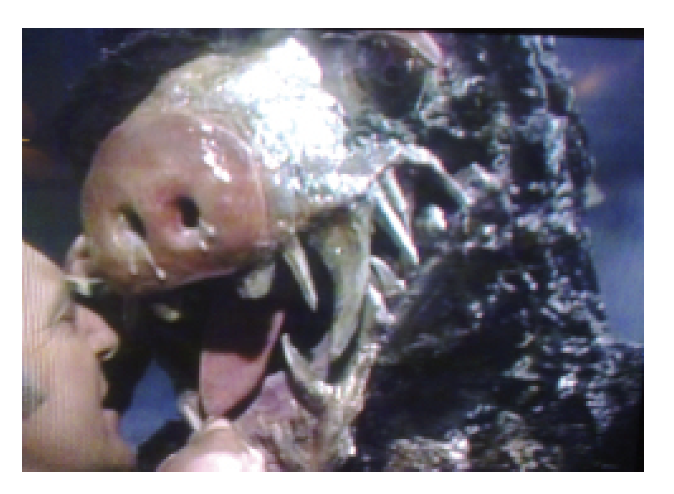There’s an anonymous cameo in the 1953 BBC sci-fi shocker The Quatermass Experiment that’s significant in inverse proportion to its screen time. Late in the live-broadcast serial, its author, then Beeb house writer and soon-to-be full-time television provocateur Nigel Kneale, turns up as an oversized, sentient shrub.
It’s in the sixth and final episode, in which error-prone astrophysicist Bernard Quatermass attempts to talk a tortured, interplanetary-virus–ridden astronaut—or astronauts, since some spaceman-on-spaceman absorption has occurred—into committing suicide. By this point the rocketmen have collectively mutated into a vegetal behemoth and taken refuge in Westminster Abbey, where it/they plan to shed a few thousand spores and destroy life as we know it.
Happily, Quatermass’s appeal to the travelers’ vestigial compassion succeeds, and the woolly critter wills itself to die, but not before we catch a solitary glimpse of it oozing from the tracery. And there’s Kneale—or his hands, anyway, as he and his wife had glued gobs of moss onto a pair of gloves which Kneale then poked through a photo of the Abbey to approximate the giant extraterrestrial horror he’d conceived.
It’s impossible to say how this penny-pinching scene plays, since only the first two episodes of Experiment survive.1 Nevertheless, it’s emblematic of what Kneale, who died in 2006 at age eighty-four, did best: get his hooks into a sacrosanct totem of human civilization and illuminate its substantive ineffectuality in an anarchic act of artistic desecration. Or at least as close to it as he could get on state television. As with all his work for the BBC and later ATV and ITV, few nerves were left unstruck.
Thomas Nigel Kneale, an Englishman by birth (and later by choice), spent his youth on the Isle of Man, from which his family originated and where his disdain for authority and tradition likely percolated. (Manx culture retains a strong anti-British bent to this day, despite having been absorbed, like those pitiful astronauts, centuries ago.) Kneale studied for and then abandoned a law career there; moving to London, he graduated from the Royal Academy of Dramatic Art and for a brief stint was an actor. Still later he published short fiction in various English magazines; his 1949 collection Tomato Cain and Other Stories won the Somerset Maugham Award (an honor his son, Matthew, duplicated for his own novel Whore Banquets in 1988). Eager to be a screenwriter, the peripatetic Kneale was hired by the BBC in 1951 as one its first staff writers. He later claimed he hadn’t even seen a TV set at the time.
Kneale initially toiled as the network’s all-purpose...
You have reached your article limit
Sign up for a digital subscription and continue reading all new issues, plus our entire archives, for just $1.50/month.
Already a subscriber? Sign in





